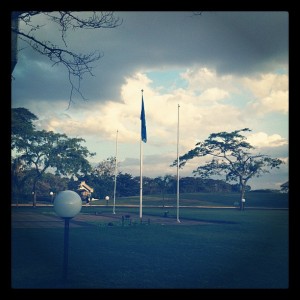This post was originally published on Global Voices Advocacy.
As the Internet Governance Forum is a truly epic event both in the online and in the offline world, it's really hard to do justice to the whole complexity of the discussions and debates that are taking place amongst hundreds of representatives from governments, companies, civil society, the technical community, and grassroots activists who have gathered for four days in Nairobi, Kenya. (To learn more about the IGF, an annual multi-stakeholder meeting to discuss key issues related to the Internet's future now in its sixth year, see the Netizen's Guide to the Internet Governance Forum on Global Voices Advocacy.)
Therefore, in true Global Voices fashion, let me share some key quotes and tweets from participants accompanied by short commentaries. (Note: some quotations might not be 100% precise.)

United Nations Office in Nairobi, the location of the Sixth Annual IGF Meeting. Photo by Alexey Sidorenko.
1. Remi Caron, a Dutch cloud computing entrepreneur:
Data Schengen agreement could be very beneficial!
Comment: Remi said that it's really easy to break various European laws in the course of providing and using third-party cloud storage across European borders. In order not to criminalize cloud data, an international agreement is needed.
2. Open letter signed by Civil Society and Internet Governance Caucus and nine other NGOs about the Russia/China proposed cyber-security code of conduct:
[…] What we miss in the proposed code of conduct is any reference to the multistakeholder approach, established by the Tunis Agenda as best practice in internet policymaking, and the role of civil society in strengthening the security and stability of the Internet as proposed by the Code of Conduct. […]
3. A debate on DNS filtering:
@JosephOwino DNS blocking of illegal online content is like curing a disease with pain killers! :p
Comment by Dan McQuillan:
yes, because you get addicted!
Comment: The panel on content blocking, held for the most part by government representatives, didn't fully reflect the multi-stakeholder approach. The dominant discourse didn't even question the need for content blocking or removal, automatically assuming that there is some content that needs to be either blocked or removed.
4. Twitterer @Tadtel:
Amazed by Kenya's 3G prices. Paid USD 10 for 1 week of unlimited 3G access.Safaricom coverage throughout Maasai
Comment: The development of Kenyan ICT is incredible (at least on a technological level) – three backbone cables connect the country to the global web, and one more is in development. The locals, however, point out that the bottleneck is not in the backbone – rather it is in compute illiteracy.
5. Burt Kaliski, Director of the EMC Innovation Network:
not only the attack, the defense can also be distributed – through the cloud. The Cloud can absorb the threat.
Comment: Speaking of the advantages of cloud computing and the Internet's future security challenges.
6. Amr Gharbeia, Egyptian social media activist, and now Technology and Freedoms Programme Officer at Egyptian Initiative for Personal Rights
Facebook and Twitter are social tools. *We* are the social network.
Comment: The Arab Spring and the much-debated mobilisation power of social networks have brought a huge wave of preventative regulation, and frankly speaking, pure fear among governments. The threat, however, is not the social networks, but the empowered citizens of the new world.
7. Panelist at panel on ccTLD's (country code top-level domain names like .uk, .cn, or .ru) :
There are three main trends in #ccTLD: Growth, growth, growth
Comment: The discussion about Internationalised Domain Names (IDN) and ccTLD's were discussed in positive, excited tones. The question of the balkanization and the fragmentation of the Internet was not debated.
8. Larry Strickling, United States Department of Commerce:
We can choose to expand bureaucracies or we can expand jobs…The future of the Internet is at risk. The multi-stakeholder model is being challenged.
Comment: Probably the most important debate of this IGF: the model of Internet governance is being challenged not only by the ‘usual suspects’ (China, Russia, etc who simply disregard the multi-stakeholder model in preference of the governance made through inter-government agreements) but also the European Union who argue for a more important role of the national governments in the decision-making process.
9. Vint Cerf, co-creator of the TCP/IP protocol and a person commonly known as the ‘father of the Internet':
We need common agreements – what is acceptable and what is unacceptable behavior on the network. This has a great deal to do with ethics.
Comment: The search of the balance of the regulation and the self-regulation is a leading idea of the IGF11. How can our global society make the Internet a space that is simultaneously secure, innovative and free? There are no easy answers.
Editor's note:
Our sister website, Global Voices Advocacy recently launched a new series called “The Netizen Report”, a regular overview of recent global developments related to the power dynamics between citizens, companies and governments on the Internet. We hope that these regular reports can provide netizens around the world with useful information about who is seeking to influence and shape the digital platforms and networks we increasingly depend upon, and how. Armed with information, we are in a better position to defend our rights, and to make sure the Internet evolves in a manner that is compatible with the right to free expression of all people, everywhere.







2 comments
Vint Cerf asks for common agreements on what is acceptable and unacceptable behavior on the network. As Google’s chief evangelist ( http://guardian.co.uk/technology/2011/sep/21/google-facebook-vint-cerf ) he could share his opinion on the behavior of Google on the net. Does he think that acceptable, and yes, on what grounds, or unacceptable, on what grounds. When users get a clue on that, it’s much easier to see what ‘ethics’ rule the network.
Untill we’ve reached global common agreements, the now existing common laws are governing internet, just like they gover analogue worlds. According to EU rulings, Google’s behavior is unacceptable.